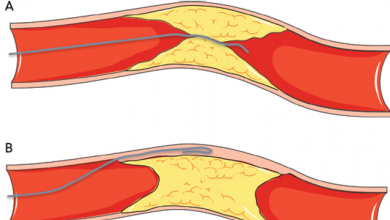Search results
Author(s):
Ali N Zaidi
,
Pamela S Ro
Added:
3 years ago
Fetal and neonatal arrhythmias are diverse in type and severity. They include both tachycardias and bradycardias.1 The innate physiological properties of the fetal and neonatal myocardium make it more vulnerable to these high or low ventricular rates. Irregularities of fetal and neonatal cardiac rhythm commonly occur and rarely have serious consequences;however, it is important to realize that…
View more
Author(s):
Johny Nicolas
,
Usman Baber
,
Roxana Mehran
Added:
3 years ago
Seminal clinical trials conducted in the balloon angioplasty and bare metal stent era established the superiority of dual antiplatelet therapy (DAPT) as compared with aspirin monotherapy or anticoagulation with respect to the prevention of thrombotic events.1,2 Other studies found that the benefits of DAPT are durable for at least 1 year and extend to patients with acute coronary syndromes.3–5…
View more
Author(s):
Jimmy Kerrigan
,
Timir K Paul
,
Jay Patel
,
et al
Added:
6 months ago
PCI for Chronic Total Occlusion
Author(s):
Giovanni Maria Vescovo
,
Carlo Zivelonghi
,
Benjamin Scott
,
et al
Added:
3 years ago
Article
Author(s):
Marvin J Slepian
Added:
3 years ago
Heart failure remains the final common pathway of all forms of heart disease. Currently, more than 20 million patients suffer with heart failure in the US and Europe combined.1 Over the past two decades, advances in medical therapeutics have made inroads in reducing mortality associated with early- and mid-stage heart failure. Unfortunately, once patients progress to advanced heart failure, i.e…
View more
Author(s):
Shamai A Grossman
Added:
3 years ago
Introduction
Congestive heart failure (CHF) is an imbalance in pump function in which the heart fails to maintain the circulation of blood adequately. The most severe manifestation of CHF, pulmonary edema, develops when this imbalance causes an increase in lung fluid secondary to leakage from pulmonary capillaries into the interstitium and alveoli of the lung.
CHF can be categorized as forward…
View more
Who should be referred for TAVR?
Author(s):
Colin M Barker
,
Michael J Reardon
Added:
3 years ago
Article
Author(s):
Maria Rosa Costanzo
Added:
3 years ago
In the US, 90% of the one million annual hospitalizations for heart failure (HF) are due to volume overload.1,2 Hypervolemia contributes to HF progression and mortality. Guidelines recommend that therapy for HF patients be aimed at achieving euvolemia. Intravenous loop diuretics induce rapid diuresis that reduces lung congestion and dyspnea. However, the effectiveness of loop diuretics declines…
View more
LVAD as Destination Therapy
Author(s):
Jorge Silva Enciso
,
Eric Adler
,
Barry H Greenberg
Added:
3 years ago
Article
Author(s):
Nandita S Scott
Added:
3 years ago
The US has the highest maternal mortality rate in the developed world, at an estimated 26.4 deaths per 100,000 live births. This rate is rising, although it is falling in other wealthy nations.1 Cardiovascular disease is a leading cause of maternal death, so cardiologists need to build on their knowledge and enhance their proficiency on the management of cardiovascular disease during pregnancy.2
…
View more
















 « First
« First